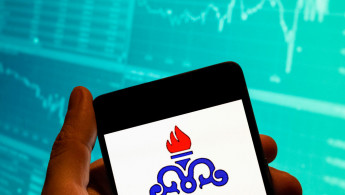Iranian officials retreat from claims over joint gas field with Kuwait and Saudi Arabia
Iranian government have come under increasing pressure from domestic critics to "defend Iran's rights" in what Iranians call the Arash gas field, known as al Durra by Kuwait and Saudi Arabia.
The disputed gas field has again captured public attention in Iran following the denial of Iran's claims by Saudi Arabia and Kuwait, who stressed "exclusive rights" over the field, which has about 220 billion cubic metres (seven trillion cubic feet) recoverable reserves.
Iran claims 40 per cent ownership of the Arash-Durra gas field. In late June, the managing director of the National Iranian Oil Company said that Iran was ready to start drilling on the Iranian side of the joint gas field.
Last week, the topic dominated headlines in numerous Faris media, and pro-reformist outlets urged President Ebrahim Raisi's administration to issue a firm response to Kuwait. However, despite the mounting criticism and public outcry, high-ranking authorities in Iran have remained silent in the face of Kuwait and Saudi Arabia's claims.
So far, the only official response from Iran was diplomatic remarks indicating that Tehran intends to hold talks with Kuwait and Saudi Arabia about the gas field.
On 10 July, in response to questions from local journalists about Tehran's potential reactions to Kuwait and Saudi Arabia, Nasser Kanaani, Iran's foreign ministry spokesman, emphasised Tehran's general policy of negotiating with other countries.
"The government's main policy is based on having dialogue, collaboration and cooperation, and within this framework, we will follow the issues [between Iran and Kuwait]", he was quoted as saying.
Similarly, Freidoon Abbasi Davani, a conservative lawmaker, echoed this sentiment by intending to resolve the issue through diplomatic channels.
"We have a share in the Arash gas field, but we will solve this problem diplomatically and in a friendly manner," Davani said.
Despite initial concerns that the disputed gas field would strain relations between Tehran and Riyadh, the Iranian authorities' responses have fueled speculation that Iran is unwilling to jeopardise its recently restored political ties with Saudi Arabia.
In March, China brokered an agreement between Tehran and Ryiadh to restore political relations after seven years of high tensions.
Abdul Rahim Ansari, a conservative journalist and vocal supporter of President Ebrahim Raisi's administration, was among the first analysts to suggest that Kuwait exploited Iran's relationship with Saudi Arabia to assert its claims over the gas field.
"The Kuwaitis count on the Iran- Saudi Arabia agreement, assuming that Iran would adopt a passive position to avoid putting the reconciliation in danger," Ansari wrote on Twitter.
Other pro-government commentators, including Hassan Haanizadeh, went even further, accusing Kuwait of acting as a puppet state influenced by the US and Israel and deliberately blocking the reconciliation process between Iran and other Arab countries in the Persian Gulf.
"Following manipulations by the US and the Zionist regime [of Israel], Kuwait began creating divergence in the region and obstructing reconciliation between Iran and the Arab countries in the Persian Gulf," he was quoted as saying by local media.
The Iranian government's lack of a strong response has allowed critics and reformists to question the administration's commitment to defending national interests.
The reformist Shargh Daily described the officials' remarks as "nothing more than promises made at speech tribunes".
The discontent surrounding the issue has extended beyond the official media, and many ordinary Iranians took on social media, criticising the administration and accusing it of surrendering the Arash gas field to its Arab neighbours.
"The Islamic Republic [of Iran] gave over the Arash gas field and offered it to Saudi Arabia and Kuwait. The Islamic Republic will cut in pieces all the shares Iran has in oil and gas fields and offer what belongs to Iranians to the neighbouring countries," wrote Hadi Sharghi on Facebook.
In the past, Iran had made attempts to establish gas extraction platforms in its territorial waters to tap into the resources of the disputed Arash-Durra gas field. However, on two separate occasions, these projects were halted due to pressures exerted by Kuwait.
The first instance occurred during the presidency of the reformist Mohammad Khatami, while the second happened under the leadership of the ultra-conservative Mahmoud Ahmadinejad.





 Follow the Middle East's top stories in English at The New Arab on Google News
Follow the Middle East's top stories in English at The New Arab on Google News


